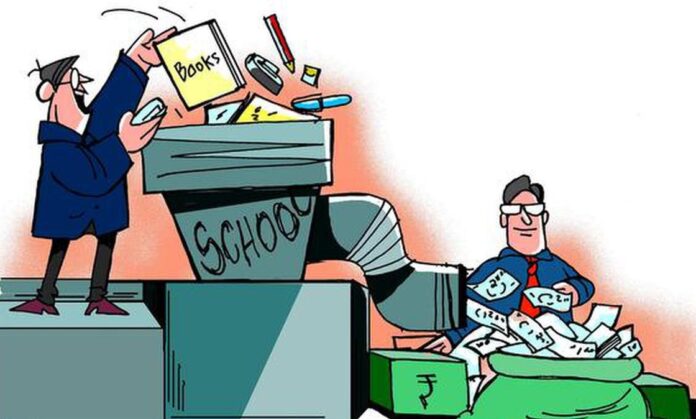In recent years, India’s education system has increasingly transformed into a profit-driven industry, where schools have become symbols of status rather than centers of learning. A growing trend among parents is the peer pressure to enroll children in expensive, elite schools, often to project wealth rather than prioritize quality education.
Schools, capitalizing on this social competition, impose staggering fees for basic services, from exorbitant tuition to parent orientation charges that, in some cases, reach up to ₹8,400. These institutions have morphed into profit houses, exploiting every opportunity to monetize education, straining parents financially and diverting attention from the core values of learning.
High Fees Driving Parental Choices
The rising cost of education has led to an alarming trend: parents are increasingly drawn to prestigious schools, often neglecting the actual educational value provided. According to a survey by the National Sample Survey Office (NSSO), nearly 25% of households in urban areas spend over ₹70,000 annually on their children’s education, while some elite institutions charge up to ₹1.5 lakh per year in tuition alone. With additional costs like uniforms, extracurricular activities, and parent orientation fees pushing the total financial burden into six figures, many parents feel compelled to invest heavily in their children’s schooling.
A significant finding from a recent survey conducted by the Indian Council for Research on International Economic Relations (ICRIER) reveals that 65% of parents believe that high fees correlate with better education quality, despite the lack of concrete evidence to support this notion. This creates an environment where education is viewed as a commodity, leading families to prioritize brand over substance. The pressure to conform to societal expectations means that many parents feel compelled to invest heavily in their children’s schooling, even if it means compromising their financial stability.

Undermining Children’s Development
The commercialization of education is eroding the essence of academic growth and moral development among students. Extravagant spending on non-academic events and showy infrastructure has overshadowed classroom learning. A report by the Ministry of Education indicates that, on average, only 30% of the budget in these elite schools is allocated to teaching staff, while 45% is spent on infrastructure and facilities aimed at attracting students and parents.
Research indicates that in these profit-centric schools, academic performance and moral integrity often take a back seat, creating a generation of students more attuned to materialism than critical thinking or ethical values. According to a study conducted by the National Council of Educational Research and Training (NCERT), 55% of students in elite schools reported feeling more pressure to maintain social status rather than focus on academic excellence. This focus on revenue generation frequently results in inadequate attention to essential subjects and life skills, ultimately leaving students ill-prepared for real-world challenges.
Furthermore, a survey by Educo India found that 70% of parents expressed concern that their children are not receiving adequate moral and ethical education in high-fee schools. Instead, the emphasis on brand reputation often prioritizes sporting events, cultural fests, and infrastructure over vital life skills such as empathy, resilience, and teamwork. This shift not only hinders personal development but also fosters a competitive environment that can lead to anxiety and stress among students.

The Profit and Commercialization Motive Behind Technology in Education
Another aspect of commercialization is the increasing reliance on technology as a profit-generating tool. Schools have begun charging for digital resources, online platforms, and supplementary learning materials. A report by KPMG states that the Indian EdTech market is expected to reach $10 billion by 2025, with many educational institutions partnering with tech companies to offer paid online courses and resources.
While technology can enhance learning experiences, the commercialization of these tools can disadvantage families who cannot afford the extra costs. A study by the Internet and Mobile Association of India (IAMAI) found that nearly 40% of students in low-income households do not have access to the necessary technology to support their education, further widening the educational divide.
Socioeconomic Implications of a Profit-Centric System
The continued focus on commercialization poses significant risks to the future of India’s youth. If schools remain profit-driven, access to quality education will become increasingly restricted to the wealthy, exacerbating socio-economic divides. Families are already facing immense financial pressure, with annual fees in prestigious institutions exceeding ₹55,000, alongside miscellaneous charges. According to a report by the All India Parents Association (AIPA), over 60% of parents feel financially strained due to rising educational costs, leading many to consider withdrawing their children from high-fee schools.
Unless reforms are introduced, the Indian education system will perpetuate inequality, depriving children of the holistic education they deserve and undermining their potential to become morally sound, intellectually capable individuals. This shift towards a consumerist model of education threatens to produce a generation that values prestige over knowledge, which could have long-lasting implications for India’s socio-economic fabric.
A Call for Systemic Reforms
Experts advocate for urgent reforms in the Indian education system to shift the focus from profit-making to genuine educational advancement. Educationists like Dr. Rukmini Banerji, CEO of Pratham Education Foundation, argue that schools should prioritize the overall development of students rather than merely compete for higher fees and status.
Additionally, government initiatives aimed at regulating school fees and ensuring transparency in financial practices can help mitigate the current trend of commercialization. Policies mandating that a certain percentage of school funds be allocated to educational resources rather than infrastructure could also alleviate financial pressure on families.
As India navigates its educational landscape, the commercialization of schools remains a pressing concern. The growing pressure to conform to social expectations has led to a significant disconnect between educational quality and financial investment, leaving many families struggling to balance prestige and substance. Without intervention, this trend will only deepen the socio-economic divide, jeopardizing the future of countless students. By prioritizing genuine educational values over profit, stakeholders can work towards creating an equitable education system that fosters the holistic development of every child.

